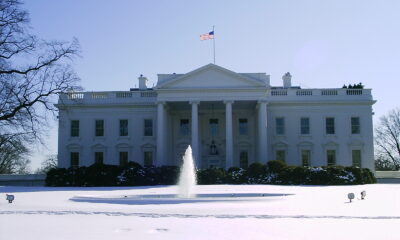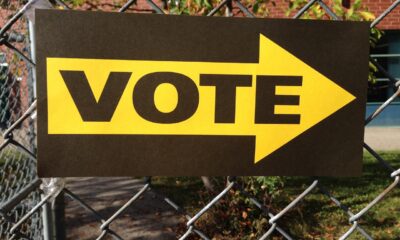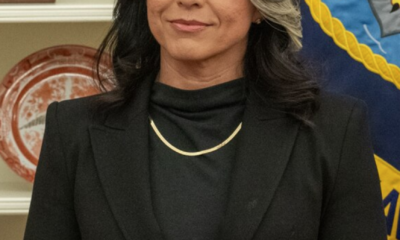Executive
Ranked-Choice Voting Rejected in Statewide Ballots
Ranked-choice voting will lose in Alaska and has lost in every State-wide proposal – but some cities still experiment with it.

Alongside high-profile races last week, voters in several states also decided on ballot measures, including ranked-choice voting. While political reformers tout the system as a way to expand voter choice and reduce political polarization, it encountered setbacks this cycle, failing to pass in most places except for a handful of cities.
How ranked-choice voting works
Ranked-choice is a method in which voters rank candidates by preference instead of selecting just one. If a candidate receives more than half of the first-choice votes, they win outright. If no candidate achieves a majority, the candidate with the fewest first-choice votes is eliminated, and voters who selected the eliminated candidate as their first choice then have their votes reallocated to their second-choice candidate. This process continues in rounds, eliminating the lowest-ranking candidates and redistributing votes based on voter preferences until one candidate reaches a majority.
Its supporters assert that this process helps create a healthier political environment – for campaigning and governing. Nick Troiano, executive director of Unite America, told RealClearPolitics that RCV incentivizes candidates to build a broader base of support. Troiano said that Unite America supports it because it ensures that the winning candidate is “able to build majority support among voters, not just plurality, and it incentivizes them to build a broader coalition and be more responsive to a broader swath of the electorate.”
Most voters in Alaska, Colorado, Idaho, Montana, Missouri, Nevada, and Oregon opposed measures to expand ranked-choice voting. Alaska’s decision was notable, as the state had adopted ranked-choice voting in 2020. While not yet officially called, Ballot Measure 2 is expected to repeal RCV, with 51% currently in favor of repealing and 49% opposed.
Alaska’s Top Four system
In addition to ranked-choice voting, Alaska had also adopted a “Top Four Election” system, where instead of normal party primaries, the primary is open to candidates from all parties, and the top four candidates with the most support advance to the general election. This can result in multiple Republicans or Democrats appearing on the same ballot in the general election.
In areas with a strong one-party presence, this system makes general election day more significant, whereas previously, only the party primaries were consequential. The top four election system was also rejected in Arizona, Idaho, Montana, and Nevada.
Sarah from Alaska
In the 2022 midterms, this system demonstrated its effects in Alaska. In a predominantly Republican state, the primary resulted in one libertarian, one Democrat, and two Republicans advancing to the general election. In the general election’s first round, the libertarian candidate was eliminated, having received less than 2% of the vote, and because no candidate received more than 50%, the lower-ranking Republican was eliminated in the second round. Despite 66.8% of his votes going to the other Republican, Sarah Palin, Democrat Mary Peltola ultimately won the seat, with 11% of the redistributed votes pushing her over the majority.
In the final round, Peltola defeated Palin 55%-45%, reversing the outcome of the 2020 Alaska House race, where the Republican incumbent won the state 54.4%-45.3%.
Ranked-choice voting and exhausted (undervoted) ballots
Ken Cuccinelli, national chairman of the Election Transparency Initiative and a critic of RCV, pointed to “ballot exhaustion” as a significant reason he opposed the system. After the second round of the 2022 race, 13,894 of the 64,449 ballots supporting the other Republican, Nick Begich, were “exhausted,” meaning the voter didn’t rank another candidate after Begich. Though the exhausted ballots did not affect the 2022 Alaska House election’s outcome, as even with the additional 13,894 votes Palin still would have lost in the third round, in closer contests exhausted ballots could change the results of the election.
Another criticism of ranked-choice voting is that it bogs things down. In the 2024 rematch between Begich and Peltola (Palin didn’t run this year) Begich has a 3.3% lead, with 92% of the vote currently counted. In a traditional race, this lead would usually suffice to call the race, but because Begich might not receive more than 50% of the vote, RCV rounds could allow Mary Peltola to retain the seat, meaning the race is still up in the air.
Cuccinelli also cited a 2022 incident in Oakland County, California, where a malfunction in the RCV tally system initially certified the wrong candidate, Nick Resnick, as the winner in a school board race. A month later, it was discovered that Mike Hutchinson, not Nick Resnick, was the actual winner. “It [RCV] creates confusion, it slows down results, and it creates complexity that voters don’t understand,” Cuccinelli told RCP.
A voting system for the cities
Nonetheless, RCV advocates like Deb Otis, director of research and policy at FairVote, view the 2022 Alaska elections as a positive demonstration of RCV, noting that “Sarah Palin had a very high disapproval rating in Alaska, so she was beat out by someone who ran a positive campaign focused on Alaska issues.”
Although it was rejected in every statewide ballot initiative where it was proposed, including both red and blue states, Otis expressed optimism, stating that RCV proponents were “excited for wins in cities, D.C., as well as a couple others … Ranked choice voting is still growing, I feel optimistic that it will continue to grow.”
In addition to Washington, D.C., ranked-choice voting was also adopted in Richmond, California, and Oak Park, Illinois, and upheld in Bloomington, Minnesota. In several states where the measure was rejected, the margins were tight: Alaska will likely repeal RCV with 51% voting against it, Montana had 51% opposed, and in Nevada 53% voted against it.
This article was originally published by RealClearPolitics and made available via RealClearWire.
Jonathan Draeger is a National Political Reporter for RealClearPolitics.
-

 Accountability3 days ago
Accountability3 days agoWaste of the Day: Principal Bought Lobster with School Funds
-

 Executive1 day ago
Executive1 day agoHow Relaxed COVID-Era Rules Fueled Minnesota’s Biggest Scam
-

 Civilization8 hours ago
Civilization8 hours agoWhy Europe Shouldn’t Be Upset at Trump’s Venezuelan Actions
-

 Constitution2 days ago
Constitution2 days agoTrump, Canada, and the Constitutional Problem Beneath the Bridge
-

 Civilization1 day ago
Civilization1 day agoThe End of Purple States and Competitive Districts
-

 Christianity Today7 hours ago
Christianity Today7 hours agoSurprising Revival: Gen Z Men & Highly Educated Lead Return to Religion
-

 Civilization5 days ago
Civilization5 days agoThe devil is in the details
-

 Executive20 hours ago
Executive20 hours agoWaste of the Day: Can You Hear Me Now?










